Digital Marketing on Social Media – Tips for Business Owners
- December 7, 2022
- Digital Marketing, Inbound Sales, Lead Generation, Social Media
Looking at doing some Digital Marketing to create a Social Media presence? Want to know if it will work for your business?
Before we dive into Social Media Marketing, I want to first state that a Social Media Marketing Strategy is quite time-consuming due to the time requirements of posting images, videos, text, etc. over several days.
As you will see in most articles that we write, we believe that as a B2B organization, you are better off doing high ROI activities to get more leads and sales. Once you have a better idea of your pipeline and a good business structure in place, then you should look into Social Media Marketing.
What is social media marketing?
Social media marketing is a form of digital marketing that leverages the power of popular social media networks to achieve your marketing and branding goals. But it’s not just about creating business accounts and posting when you feel like it. Social media marketing requires an evolving social strategy with measurable goals and includes:
- Maintaining and optimizing your social profiles.
- Posting pictures, videos, stories, and live videos that represent your brand and attract a relevant audience.
- Responding to comments, shares, and likes and monitoring your reputation.
- Following and engaging with followers, potential customers, and influencers to build a community around your brand.
Social media marketing also includes paid social media advertising, where you can pay to have your business appear in front of large volumes of highly targeted social media users.
Benefits of social media marketing
With such widespread usage and versatility, social media is one of the most effective free channels for marketing your business today. Here are some of the specific benefits of social media marketing:
- Humanize your business: Social media enables you to turn your business into an active participant in your market. Your profile, social posts, and interactions with social media users form an approachable persona that your audience can familiarize and connect with, and come to trust.
- Drive traffic: Between the link in your profile, blog post links in your posts, and your ads, social media is a top channel for increasing traffic to your website where you can convert visitors into customers. Plus, social signals are an indirect SEO factor.
- Generate leads and customers: You can also generate leads and conversions directly on these platforms, through features like Instagram/Facebook shops, direct messaging, call to action buttons on profiles, and appointment booking capabilities.
- Increase brand awareness: The visual nature of social media platforms allows you to build your visual identity across vast audiences and improve brand awareness. And better brand awareness means better results with all your other campaigns.
- Build relationships: These platforms open up both direct and indirect lines of communication with your followers through which you can network, gather feedback, hold discussions, and connect directly with individuals.
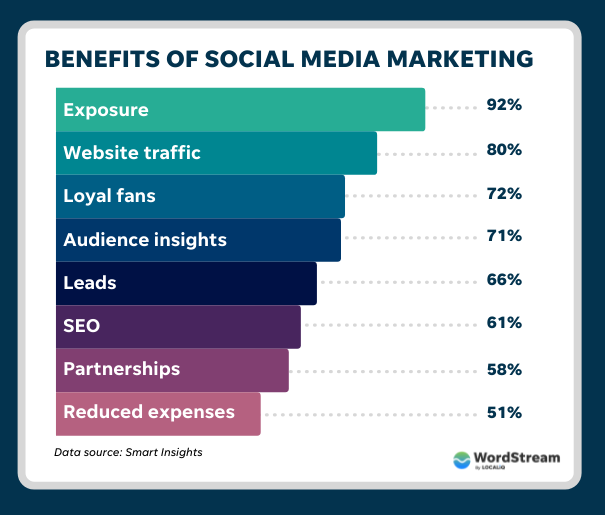
The bigger and more engaged your audience is on social media networks, the easier it will be for you to achieve your marketing goals.
The essentials of a successful social media marketing strategy
A successful social media marketing strategy will look different for every business, but here are the things they will all have in common:
- Knowledge of your audience: What platforms they use, when they go on them and why, what social media content they like, who else they’re following, and more.
- Brand identity: What is the message you want to convey to your audience? How do you want them to feel when viewing your content?
- Content strategy: While there is a level of spontaneity on social networks, you’ll need a structured content strategy to be able to have a consistent voice and produce quality compelling content regularly.
- Analytics: Quantifiable insights will inform your strategy, including who you’re reaching, the right content to share, the best times to post, and more.
- Regular activity: Social media is a real-time platform. If you want to use it to grow your business, you need to post regularly, stay on top of engagements with your business, engage back, keep up with social media trends, and maintain accurate profiles.
- Inbound approach: Don’t use social media to pitch your business. Focus on adding value through useful and interesting content and building up those around you. This, in turn, will organically promote your business and others will promote it for you.
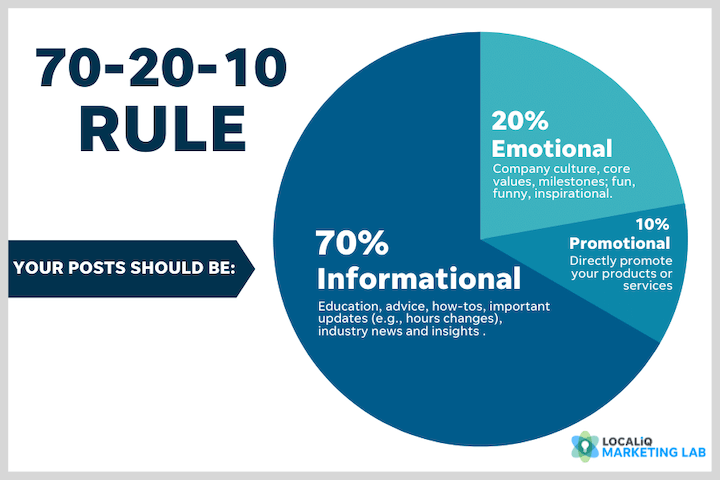
Creating your social media marketing plan
Now that you know the essentials of a social media marketing strategy, it’s time to put it into action. Your social media marketing plan is the roadmap to carrying out your social media strategy. It puts structure around your efforts so you can measure your success and make sure you’re spending your resources wisely. Here’s how to create your social media marketing plan:
- Choose your platforms: Choose based on your target audience, platforms popular for your industry, as well as your bandwidth. Only take on the number of platforms you can actively keep up with. You can always start with one and then add on more slowly as you get the hang of them.
- Set goals and objectives: These should be simple and task-like to start, like posting once a day for a month, getting your profiles set up, or doing a competitive analysis. Once you get into a rhythm and gather insights, you’ll be able to set more specific and strategic business goals like increasing your following by X% or publish X [content types you’ve found your target audience likes] per month.
- Report and adjust regularly: Use each platform’s analytics to identify which posts generate the highest engagement rates, whether you’re getting more followers, and to see your target audience demographics. Harness and scale up what works and nix what doesn’t.
Social media marketing tips
Ready to get started with marketing on social media? Here are a few social media marketing tips to kick off your social media campaigns.
Create diverse types of content
Consistent with other areas of online marketing, content reigns supreme when it comes to social media marketing. Make sure you post regularly and offer truly valuable information that your ideal customers will find helpful and interesting. This includes:
- How-tos, quick tips
- Local and industry news
- Data and insights
- Polls, questions, contests
- Updates and announcements
It also means making use of the variety of formats social media offers, including images, videos, stories, live streams, online stores, and more.
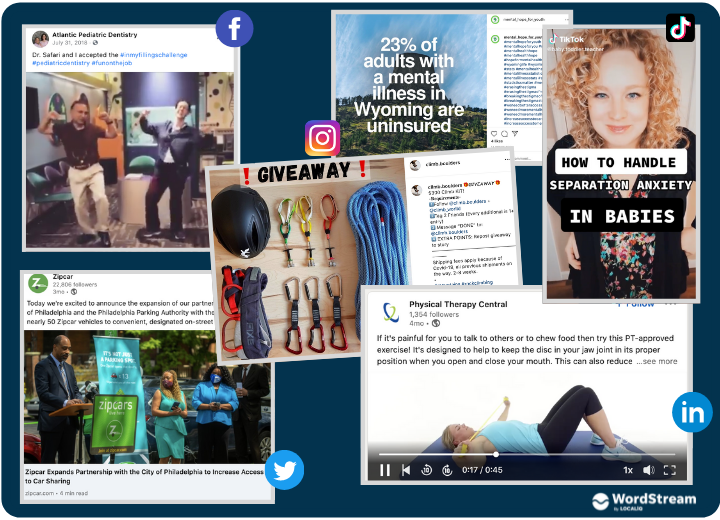
Stay consistent
Using social media for marketing enables your business to project your brand image across a variety of different social media platforms. While each platform has its own unique environment and voice, your business’s core identity, whether it’s friendly, fun, or trustworthy, should stay consistent.
Don’t just post—participate
In other words, don’t just log in once a month to schedule out all your posts. Social channels are communities. You need to pay attention to who’s engaging with your content and engage back—respond to comments, like, share and comment on their posts, run live streams, post polls and real-time questions to spark discussions, and repost others’ content.
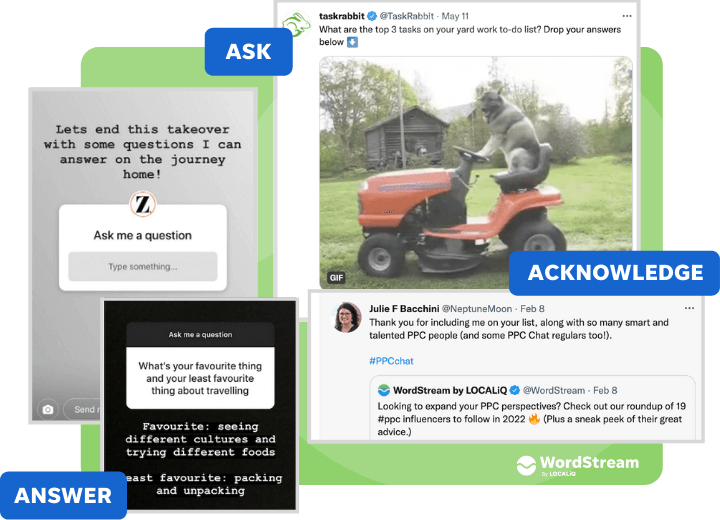
Use content creation tools
Don’t let anyone tell you that Instagram is the most visual social media platform. They all are! If you want to stand out in a person’s feed, you need to accompany your posts with attractive visuals—photos, illustrations, text turned into art. Content creation tools like Canva have templates and features that allow you to quickly create visuals that look professional, have your logo on them, and are consistent with your brand.
Repurpose, repost, recycle
Social media is a crowded place, so if you want to gain traction with your audience, you need to post great content regularly. The secret to doing this? The three Rs:
- Repurpose: Create a Facebook post from a customer review, splice up a blog post into a series of Tweets, distill a case study down into a customer spotlight on Instagram; turn a webinar deck into a carousel post on LinkedIn. The possibilities are endless.
- Repost: To be done in moderation, but a great way to fill gaps in your content calendar and set up posts in advance. Repost on Instagram and retweet user-generated and influencer content. You can also curate content from authoritative sources and share those links in your posts.
- Recycle: Post your TikTok videos and Instagram Reels to YouTube; re-share your top-performing blog posts every month to get in front of new followers; add your Facebook Live recordings to your YouTube channel.
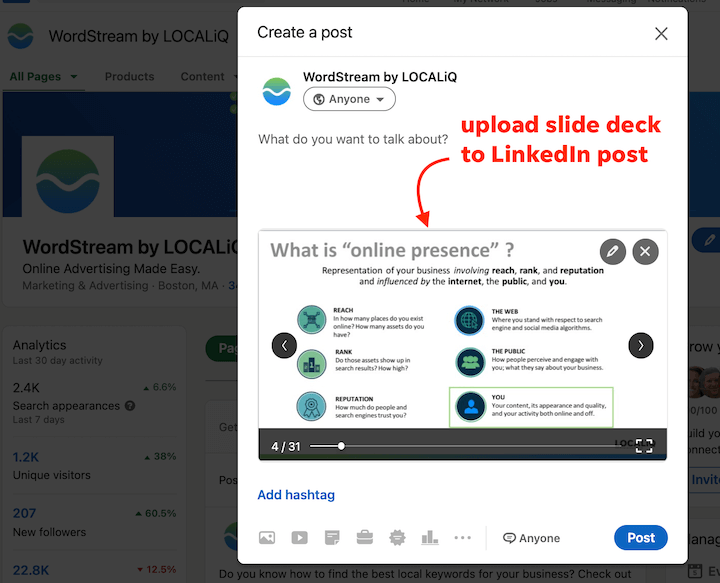
Curate your own feed
We’re always looking for ways to show up in others’ feeds, but we forget that there is value to be derived from our own. Follow your competitors so you can keep tabs on them, get ideas you can adapt to your own strategy, and identify gaps you can fill. Follow influencers to stay on top of trends and educate yourself. Follow brands that share your values or that have great content strategies for inspiration and outside the box ideas.
Measure success with analytics
You can’t determine the success of your social media marketing strategies without tracking data. Google Analytics can be used as a great social media marketing tool that will help you measure your most triumphant social media marketing techniques, as well as determine which strategies are better off abandoned. Attach tracking tags to your social media marketing campaigns so that you can properly monitor them. And be sure to use the analytics within each social platform for even more insight into which of your social content is performing best with your audience.
Try paid social
Among the many reasons to advertise on social media is that it is a highly cost-effective way to expand your reach. If you play your cards right, you can get your content and offers in front of a huge audience at a very low cost. Most social media platforms offer incredibly granular targeting capabilities, allowing you to focus your budget on exactly the types of people that are most likely to be interested in your business. Below are some tips and resources for getting started with paid social media marketing:

Takeaways
- Social media is an effective way to reach new audiences with engaging content
- Social engagement helps you build trust, authority and also to show your brand personality
- You need a solid plan for engaging content to distribute via social media
With more than three billion people around the world using social media every month, the users and engagement on major platforms just keep increasing.

What you might not know is that you’re ready to get your company’s social media off the ground right now. You don’t need to know every intimidating buzzword or have the magic number of followers. You can get started immediately—and even enjoy yourself in the process.
A growing Social media usage globally provides immense potential for businesses because consumers habitually log on to it daily and are exposed to companies. It also presents huge challenges for businesses, however, because it’s an ever-changing space that is extremely noisy and crowded.
It can be difficult to keep up with evolving trends on social media, so B2B reviews and ratings firm Clutch partnered with marketing agency Smart Insights to learn the current state of social media marketing; they surveyed 344 social media marketers from around the world to determine the value of social media, the most engaging content to share, common challenges, and what social media resources businesses are investing in.
The results?
- 52 percent of social media marketers believe social media positively influences their company’s revenue and sales.
- The five most valuable social media platforms:
- Facebook (89 percent)
- LinkedIn (83 percent)
- YouTube (81 percent)
- Twitter (80 percent)
- Instagram (56 percent)
- Nearly 80 percent of companies share mostly original content on social media.
- The most important social media metrics for companies are engagement (36 percent) and conversion rates (35 percent).
- Social media is more valuable to B2C (58 percent) than B2B companies (46 percent).
- The biggest challenges with social media are:
- Not having enough human and financial resources (26 percent)
- Lacking a formal strategy (24 percent)
- Building a community of followers and influencers (24 percent)
The Serial Seller Conclusion
As we mentioned at the start of the article… Social Media Marketing is great for businesses. Personally, we feel that it is more effective for B2C businesses than it is for B2B businesses. It acts as a better leads funnel and keeps your opportunities (clients) warm.
For B2B businesses it should not be at the forefront of your mind when you think about sales and marketing. Social Media Marketing will increase your brand awareness and help you stay at top of mind for your clients for the next time they make a purchase, but also so should a good account manager…
If you want incorporate Social Media Marketing and social selling into your digital marketing strategy, we can assist in a few ways;
- Managing your socials i.e. posting on your behalf and responding to clients
- Running Paid Campaigns via Facebook Ads
If these two examples sound like something you’re interested in. Book A Call With Us Now!
About us and this blog
We are a Full-Service Sales & Marketing provider that aims to help small to medium businesses increase their leads and sales while helping remove the business owners from their day-to-day activities so they can focus more on the long-term goals of their business.
Book a Meeting with us!
We offer Done-For-You Sales, Sales Coaching, and Advisory as well as Digital Marketing Services. If you want to increase the leads generated for your business and need some guidance and accountability, book a call with us now.

